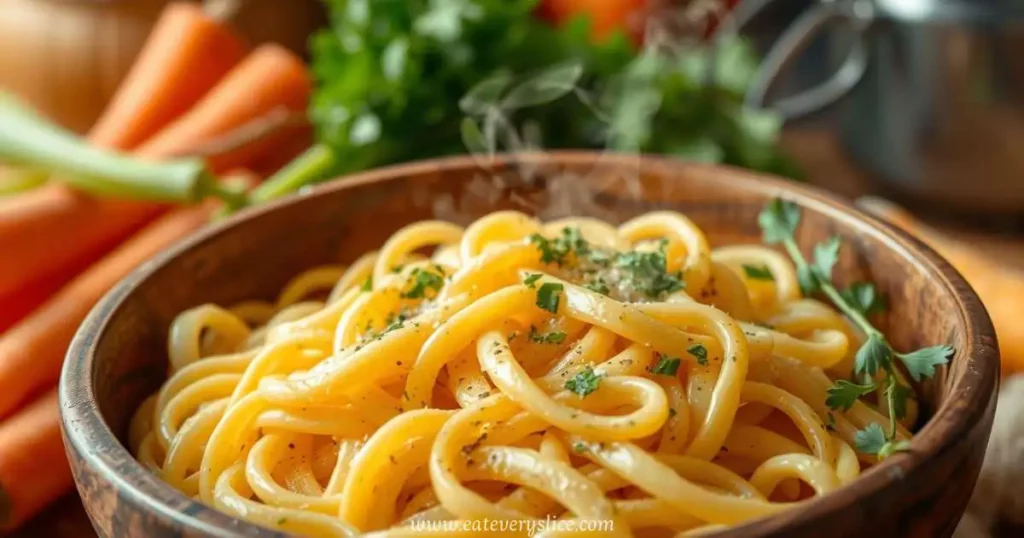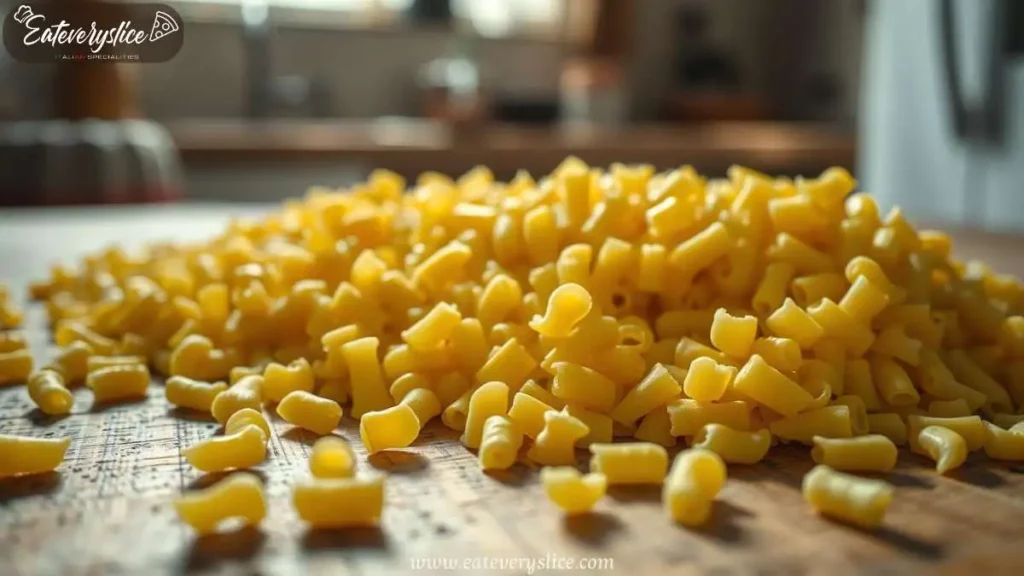Last updated on March 30th, 2025 at 07:26 am
Table of Contents
When the smell of broth and herbs fills the kitchen, it’s hard not to feel cozy. A warm bowl of ditalini soup pasta is especially comforting. This Italian dish, with its small pasta and tasty ingredients, feels like a trip to Puglia.
Whether you’re an experienced cook or new to Italian food, learning to make ditalini soup is rewarding. It’s a journey filled with delicious moments.

Key Takeaways
- Ditalini pasta is a small, tube-shaped pasta that originates from the Puglia region of Italy.
- Properly cooking the ditalini pasta is crucial for achieving the perfect texture in your soup.
- Selecting the right ingredients, from the broth to the vegetables, can elevate your ditalini soup to new heights of flavor.
- Mastering the timing and temperature control during the cooking process can ensure your ditalini soup is perfectly al dente.
- Incorporating protein sources and beans can transform your ditalini soup into a satisfying and nutritious meal.
Understanding Ditalini Pasta: Shape, Size, and Origin
Ditalini pasta is a small, tube-shaped pasta from Italy’s Puglia region. Its name, “little thimbles,” fits its shape perfectly. Ditalini noodles are smaller than ditaloni and ditali, making them great for soups and stews.
Traditional Uses in Italian Cuisine
In Italian cooking, pasta ditalini is a key ingredient in the south. It’s found in bean soups, minestrone, and other hearty dishes. The dilanti pasta shape traps flavors, making each bite full of taste.
Why Ditalini Works Best in Soups
- The small, hollow shape of ditalini pasta absorbs broth flavors well.
- Its compact size prevents it from becoming mushy, even after long simmering.
- The tube shape keeps its texture, enhancing the soup’s mouthfeel.
Difference Between Ditalini and Tubetti
Ditalini and tubetti look similar but differ in size and use. Tubetti is larger, ideal for creamy soups and pasta bakes. Ditalini, being smaller, is best for thick, brothier soups and stews.

“Ditalini pasta is a staple in many classic Italian soups, with its distinctive shape and size enhancing the overall dish.”
Essential Ingredients for Classic Ditalini Soup pasta
Making a true Italian ditalini soup pasta needs careful picking of ingredients. At its core are the small, tube-shaped ditalini pasta, about 1/4 to 1/2 inch long. This shape is key for traditional Italian dishes. In the U.S., the smoother lisci ditalini is more common than the ridged rigate type found in Italy.
To make the best ditalini soup pasta, you’ll need a mix of aromatic veggies like diced carrots, celery, and onions. These are the mirepoix that gives the soup its flavor. Garlic, tomato sauce, and quality chicken broth are also key. Plus, dried herbs like parsley, basil, oregano, thyme, and marjoram add depth.
Protein like ground beef or Italian sausage can be added. Beans such as cannellini or Great Northern add texture and heartiness. And don’t forget the grated Parmesan or Romano cheese for a rich, nutty taste.
| Ingredient | Quantity |
|---|---|
| Olive oil | 2 tablespoons |
| Carrots, diced | 2 medium |
| Celery, diced | 2 ribs |
| Onion, diced | 1 medium |
| Garlic, minced | 3 cloves |
| Tomato sauce | 1 (15 oz) can |
| Chicken broth | 4 cups |
| Dried parsley, basil, oregano, thyme, marjoram | 1 teaspoon each |
| Ditalini pasta | 1 1/2 cups (dry) |
| Cannellini beans, drained and rinsed | 1 (15 oz) can |
| Great Northern beans, drained and rinsed | 1 (15 oz) can |
| Grated Parmesan or Romano cheese (optional) | For serving |
With these key ingredients, you’re ready to make a classic, comforting ditalini soup pasta. It will take you straight to Italy. Buon appetito!

Proper Preparation Techniques for Ditalini
To get the perfect texture in your ditalini pasta soup, you need to prepare it right. Cooking the noodles to an al dente consistency is key. This requires careful timing and temperature control. Here are some tips to help you cook ditalini pasta like a pro.
Al Dente Cooking Tips
Cook your ditalini pasta in salted boiling water for about 8 to 9 minutes. This ensures the noodles have a nice bite but are still tender. They’ll blend well into your soup.
Timing and Temperature Control
When cooking ditalini noodles, timing and temperature are crucial. Start by boiling a large pot of water. Then, add the pasta. Keep the water boiling to avoid mushy noodles.
Salt Water Ratios
For cooking how long to cook ditalini pasta, use 1 tablespoon of salt for every 4 quarts of water. This salt level brings out the pasta’s natural flavors and keeps it from tasting bland.
By using these preparation tips, you’ll make a ditalini soup with the perfect texture and taste. Enjoy every spoonful!

“Achieving perfectly cooked ditalini is key to crafting an outstanding soup.”
Creating the Perfect Soup Base
The key to a great broth pasta or Italian soup pasta is a tasty soup base. Start by cooking a mix of diced onions, carrots, and celery in olive oil. Let them soften and get a bit caramelized.
Add minced garlic and let it cook until it smells amazing. For a richer soup, brown 80% lean ground beef first. Then, add the vegetables to the pan.
Next, pour in chicken broth and a bit of tomato sauce or crushed tomatoes. Add dried herbs like oregano, basil, and thyme for that Italian taste. Let it simmer for about 20 minutes to blend the flavors.
| Ingredient | Quantity |
|---|---|
| Olive oil | 2 tablespoons |
| Onion, diced | 1 cup |
| Carrots, diced | 1 cup |
| Celery, diced | 1 cup |
| Garlic, minced | 3 cloves |
| Ground beef, 80% lean | 1 pound |
| Chicken broth | 4 cups |
| Tomato sauce | 1 cup |
| Dried oregano | 1 teaspoon |
| Dried basil | 1 teaspoon |
| Dried thyme | 1/2 teaspoon |
This soup base is the perfect start for your broth pasta or Italian soup pasta. Add ditalini pasta, beans, and more to make a filling meal.
Vegetable Combinations and Aromatics
Creating a tasty Italian soup pasta starts with the right mix of vegetables and aromatics. The base of many minestra pasta dishes is a classic mirepoix. This is a mix of finely diced onions, carrots, and celery.
Mirepoix Preparation
To make the mirepoix, sauté the vegetables in olive oil over medium heat. They should be soft and fragrant in about 10 to 15 minutes. This process builds a rich and flavorful base for the soup.
Herb and Seasoning Blends
Add a mix of dried herbs like basil, oregano, thyme, and marjoram to your soup. These herbs boost the flavor and add a touch of Italy. Finish with fresh parsley for a burst of freshness.
Don’t just stick to the classic mirepoix. Try adding diced tomatoes, zucchini, spinach, or pumpkin to make your soup unique. Choose based on what you like and the season.
There’s no limit to what you can do with Italian soup pasta. Mastering mirepoix and finding the perfect herb blend can take your minestra pasta to new levels of taste.
Protein Options for Your Soup
When making your ditalini soup pasta, you can pick from many protein options. You can choose ground beef, but there are other choices too. These options can make your soup taste better and be healthier.
Lean ground beef is a classic choice. It adds a rich flavor to the soup. Italian sausage is another great option. It brings bold Italian flavors and a bit of spice.
For a leaner choice, try shredded chicken. It mixes well with the broth and is tender. Vegans and vegetarians can use beans. Beans are a tasty, protein-rich substitute for meat.
| Protein Option | Protein Content per Serving |
|---|---|
| Lean Ground Beef (80% lean) | 25g |
| Italian Sausage | 28g |
| Shredded Chicken | 27g |
| Beans (e.g., Cannellini, Great Northern) | 15-18g |
Choose a protein that fits your taste and diet. Make sure it blends well with the ditalini soup pasta. Try different proteins to find the best one for your Italian soup pasta.
Bean Varieties and Their Cooking Times
Beans are key in ditalini soup pasta, adding protein and texture. Cannellini beans and great northern beans are favorites in Italian soup pasta.
Cannellini Beans Preparation
Cannellini beans, or white kidney beans, are tasty and versatile. For canned beans, simply drain and rinse them before use. For dried beans, soak them overnight and cook for 45-60 minutes until tender.
Great Northern Beans Usage
Great northern beans have a creamy texture, perfect for ditalini soup pasta. Like cannellini beans, use canned or cook dried beans for 45-90 minutes until tender.
Soaking dried beans overnight helps with cooking time and digestibility. This step is key for the best texture and flavor in your soup.
“The key to a truly delicious ditalini soup pasta is the perfect balance of beans, pasta, and aromatic vegetables. Taking the time to prepare the beans properly will elevate the entire dish.”
Broth Selection and Enhancement
The broth you pick is key to your ditalini soup pasta’s flavor. Low-sodium chicken broth is common, but vegetable broth works for a veggie version. Adding tomato sauce and diced tomatoes can make the broth richer.
A bit of sugar, about 2 teaspoons, can balance the tomatoes’ acidity. This small addition can greatly improve the taste.
For a more intense broth, mix different broths. Chicken and beef broths together offer a deep flavor. Or, try a vegetable broth with herbs and spices for a unique taste.
Finding the right broth balance is crucial. It should enhance the other ingredients in your soup. With some trial and error, you can create a broth that highlights your ditalini soup pasta.
| Broth Type | Flavor Profile | Recommended Uses |
|---|---|---|
| Chicken Broth | Light, savory | Classic Italian soup pasta |
| Vegetable Broth | Earthy, versatile | Vegetarian/vegan ditalini soup pasta |
| Beef Broth | Rich, hearty | Hearty, slow-simmered ditalini soup pasta |
| Tomato-Based Broth | Robust, acidic | Ditalini soup pasta with bold, tomatoey flavors |
The broth you choose greatly affects your ditalini soup pasta’s taste and texture. Try different broths to find the perfect match for your recipe.
Storage and Reheating Guidelines
Keeping your ditalini soup pasta fresh is key. Follow these easy steps to keep your leftovers tasty and fresh.
Preventing Pasta from Getting Mushy
When storing your Italian soup pasta, keep the cooked pasta and soup apart. This stops the pasta from getting too soft. Keep the soup in a sealed container in the refrigerator for up to three days.
Freezing Instructions
You can freeze your ditalini soup pasta for up to 3 months. Store the soup and pasta in separate airtight containers or bags. To defrost, let it sit in the fridge overnight and then reheat.
To reheat, warm the soup gently on the stovetop over medium heat. Add the pasta just before serving. This keeps the pasta’s texture perfect and your meal delicious.
| Storage Method | Duration | Instructions |
|---|---|---|
| Refrigerator (Soup, without pasta) | Up to 3 days | Store in an airtight container |
| Freezer (Soup and pasta stored separately) | Up to 3 months | Thaw overnight in the refrigerator before reheating Reheat soup on the stovetop, adding pasta just before serving |
By following these tips, you can enjoy your homemade ditalini soup pasta for days or weeks. You won’t lose any texture or flavor.
Common Cooking Mistakes to Avoid
When making ditalini soup pasta, it’s key to avoid common mistakes. First, don’t overcook the ditalini noodles. They should be al dente, firm yet tender. If you add uncooked pasta to the soup, it can become mushy and unappetizing.
Also, don’t forget to season the soup well. Taste it and adjust the salt and pepper to get the flavors right. Avoid using high heat when simmering. This can make the ingredients break down too much, ruining the texture and look.
By avoiding these mistakes and following the right steps for how long to cook ditalini pasta, your soup will always be perfect and delicious.
FAQ
What is ditalini soup pasta?
Ditalini soup pasta is a beloved Italian dish. It combines small tube-shaped pasta with various ingredients. This creates a hearty and flavorful soup.
What is the preparation time for ditalini soup pasta?
Preparing ditalini soup pasta takes about 40 minutes. This includes 10 minutes of prep and 30 minutes of cooking.
What is ditalini pasta?
Ditalini is a small, tube-shaped pasta from Italy. Its name means “little thimbles” in Italian. It’s great in soups because it holds flavor and keeps its texture.
How does ditalini differ from tubetti pasta?
Ditalini is slightly smaller than tubetti pasta.
What are the essential ingredients for classic ditalini soup pasta?
Classic ditalini soup pasta includes olive oil, diced carrots, celery, onions, garlic, tomato sauce, and chicken broth. It also has dried herbs like parsley, basil, oregano, thyme, and marjoram. Plus, ditalini pasta and beans like cannellini and great northern.
How do you properly cook ditalini pasta?
Cook ditalini in salted water for about 8 minutes, until al dente. Use approximately one tablespoon of salt for every four quarts of water. Timing and temperature are key to avoid overcooking.
How do you create a flavorful broth for ditalini soup pasta?
Start by sautéing onions, carrots, and celery in olive oil. Add garlic, tomato sauce, chicken broth, and herbs. For a heartier soup, brown ground beef first.
What are the key vegetable combinations and herb blends for ditalini soup pasta?
Use a mirepoix of diced onions, carrots, and celery as the base. Add a mix of dried herbs like basil, oregano, thyme, and marjoram. Adding fresh parsley at the end brings a burst of vibrant flavor.
What protein options can be used in ditalini soup pasta?
You can use lean ground beef, Italian sausage, or shredded chicken. For a vegetarian option, focus on the beans for protein.
What types of beans are commonly used in ditalini soup pasta?
Cannellini and great northern beans are favorites. Use canned beans, drained and rinsed, for convenience. For dried beans, soak them overnight and cook them separately before adding to the soup.
What types of broth can be used for ditalini soup pasta?
Low-sodium chicken broth is common, but vegetable broth works for vegetarians. Adding tomato sauce and diced tomatoes enhances the flavor.
How do you properly store and reheat ditalini soup pasta?
Store the soup without pasta in an airtight container in the fridge for up to 3 days. Keep pasta separate to prevent mushiness. Freeze the soup and pasta separately for up to 3 months. Thaw overnight before reheating.
What are some common mistakes to avoid when preparing ditalini soup pasta?
Don’t overcook the pasta, add uncooked pasta to the soup, skimp on seasoning, or use high heat when simmering.






